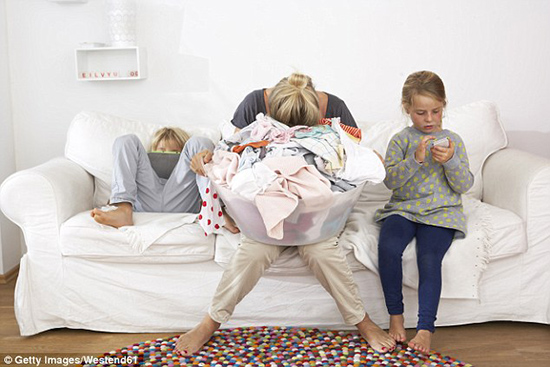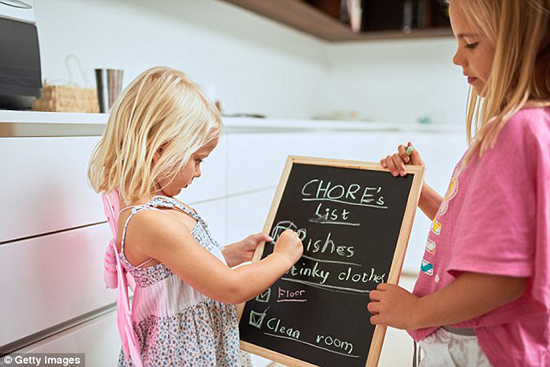

Parents often get angry when their children forget their chores and homework
New research suggests setting reminders and visual cues is better than nagging
Parenting expert Justin Coulson said it pays to be patient with forgetful children
In many families, children will forget to do their chores and homework on a daily or weekly basis.
This usually leads to yelling and nagging from parents but according to new research, setting reminders and visual cues for forgetful children could be a better solution.
Researchers from The University of Queensland's School of Psychology found children were unlikely to set themselves reminders to compensate for their anticipated memory failures until around nine years of age or older.

A computer game was used to ask children aged between seven and 13 to remember to perform a number of simple actions.
The children were then given the option to set reminders if they wanted to.
UQ PhD student Adam Bulley said when asked, children of all ages realised that their performance would be worse when there was more to remember.
'However, only older children around nine and above set more reminders when they thought their memory would be worse,' Mr Bulley said.

'That suggests simply telling young children "not to forget" is unlikely to make any difference to memory performance.'
Mr Bulley said encouraging and helping children to set reminders to improve their memory performance could prevent chores and homework falling by the wayside.
'For example, placing a timetable of weekly household chores on a child's bedroom door would alleviate their need to remember these actions by themselves,' Mr Bulley said.
'Leaving key items by the front door can also activate the memory to pack their school bag with the things they need for the day ahead.

'Young children, who are forgetful at the best of times, may be among the most likely to benefit from these strategies.'
But what happens if children do forget to make their bed or practice their timetables?
Leading Australian parenting expert and father of six girls, Justin Coulson, said it pays to be patient and avoid criticising your child.
'I love the story in Between Parent and Child. Haim Ginott offers a simple comparison. A friend comes to your home and it is raining. When they leave, the rain has stopped and they inadvertently forget their umbrella,' he said on his website.
'Do you chase them outside, shouting about how forgetful they are, and shove the umbrella into their hands, annoyed at the ten seconds of inconvenience they've caused? Not usually. We are far more polite to our friends.
'By avoiding criticism and contempt, showing humility, kindness, and unconditional positive regard, we make our relationships with our children healthy and positive, and we make our families happy.'
The study was published in Child Development.
 Fire brigade in Shanghai holds group wedding
Fire brigade in Shanghai holds group wedding Tourists enjoy ice sculptures in Datan Town, north China
Tourists enjoy ice sculptures in Datan Town, north China Sunset scenery of Dayan Pagoda in Xi'an
Sunset scenery of Dayan Pagoda in Xi'an Tourists have fun at scenic spot in Nanlong Town, NW China
Tourists have fun at scenic spot in Nanlong Town, NW China Harbin attracts tourists by making best use of ice in winter
Harbin attracts tourists by making best use of ice in winter In pics: FIS Alpine Ski Women's World Cup Slalom
In pics: FIS Alpine Ski Women's World Cup Slalom Black-necked cranes rest at reservoir in Lhunzhub County, Lhasa
Black-necked cranes rest at reservoir in Lhunzhub County, Lhasa China's FAST telescope will be available to foreign scientists in April
China's FAST telescope will be available to foreign scientists in April "She power" plays indispensable role in poverty alleviation
"She power" plays indispensable role in poverty alleviation Top 10 world news events of People's Daily in 2020
Top 10 world news events of People's Daily in 2020 Top 10 China news events of People's Daily in 2020
Top 10 China news events of People's Daily in 2020 Top 10 media buzzwords of 2020
Top 10 media buzzwords of 2020 Year-ender:10 major tourism stories of 2020
Year-ender:10 major tourism stories of 2020 No interference in Venezuelan issues
No interference in Venezuelan issues
 Biz prepares for trade spat
Biz prepares for trade spat
 Broadcasting Continent
Broadcasting Continent Australia wins Chinese CEOs as US loses
Australia wins Chinese CEOs as US loses